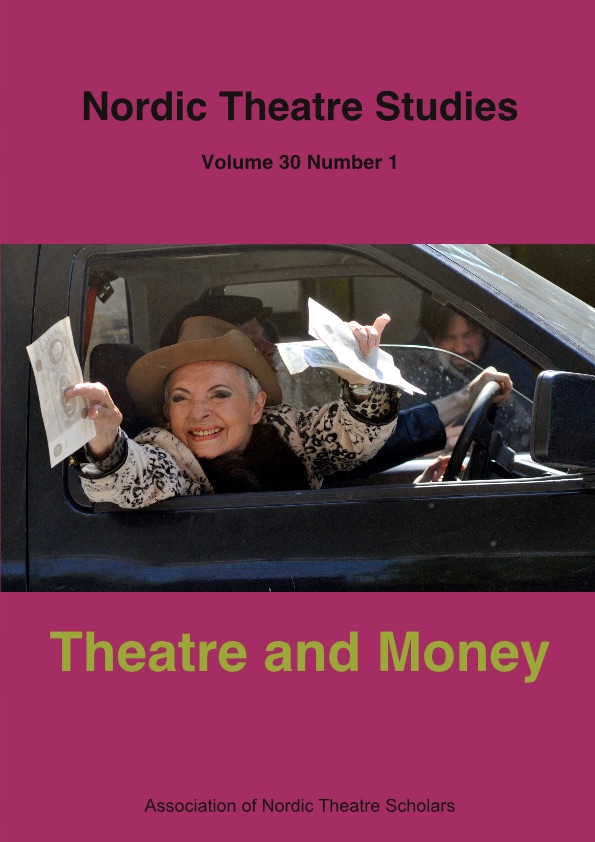Infrastructural Performance
Reclaiming Social Relationality in Times of Structural Precarity
DOI:
https://doi.org/10.7146/nts.v30i1.106915Keywords:
Infrastructural performance, structural precarity, neoliberalism, performance art, collectivism, self-organisationAbstract
As freelance workers are living in inconstancy and increasing social isolation, a crucial question arises: how can solidarity be reclaimed through a critique of structural precarity? Precarity as a consequence of neoliberal working conditions is analysed and problematized across academic disciplines. Departing from Lauren Berlant’s description of structural precarity and Judith Butler’s elaborations on performativity, I propose the term infrastructural performance in order to portray artistic strategies which criticize inequality and organize collectively. I analyse the infrastructural performance of the performance art collective cobratheater.cobra to show how precarity has provoked organisational and artistic reconfigurations in the independent performance art scene. I demonstrate how features within the neoliberal work ethos such as the repetition of the artistic signature, individualisation, and the imperative of mobility are dismantled by the group’s infrastructural performance. I conclude that infrastructural performance criticises structural precarity through collective actions of infection, exposure, and disobedience. It is a new form of collective artistic organisation, which proposes the possibility of change in social and economic conditions. At the end of the article, I speculate how infrastructural performance might change the conception of the art work itself.
References
Berlant, Lauren. 2011a. “Austerity, Precarity, Awkwardness.” Supervalentthought.Files.Worldpress.Com. https://supervalentthought.files.wordpress.com/2011/12/berlant-aaa-2011final.pdf
Berlant, Lauren. 2011b. Cruel Optimism. Durham: Duke University Press.
Berlant, Butler, Cvejic, Lorey, Puar and Vujanovic. 2012. "Precarity Talk: A Virtual Roundtable with…." TDR: The Drama Review 56 (4, Winter 2012 (T216)): 163–177.
Brown, Wendy. 2015. Undoing the Demos. New York: Zone Books.
Butler, Judith. 2017. Acting in Concert: a conversation with Judith Butler. Ed. Jean-Philippe Cazier: Verso Books.
Bürger, Peter. 1974. Theorie der Avantgarde. Frankfurt am Main: Suhrkamp.
Gerlach, Carolin. 2016. Caro von Cobra auf Kampnagel. Private script.
Henriksson, Minna, Erik Krikortz and Airi Triisberg. 2015. Art Workers – Material Conditions and Labour Struggles in Contemporary Art Practice. Berlin/ Helsinki/Stockholm/ Tallinn.
http://www.art-workers.org/index.php
Kunst, Bojana. 2015. Artist at Work. Proximity of Art and Capitalism. New York: Zero Books.
Lorey, Isabell. 2012. Die Regierung der Prekären. Wien/Berlin: Turia + Kant.
Lorey, Isabell. 2006. “Governmentality and Self-Precarization. On the normalization of cultural producers”. http://eipcp.net/transversal/1106/lorey/en/print (18. April 2016)
Marx, Karl. 1887 (1867). Capital. A Critique of Political Economy, volume 1. Moscow: Progress Publishers.
Raunig, Gerald and Ulf Wuggenig. 2016. Kritik der Kreativität. Linz, Berlin, London, Zürich: transversal texts.
Schmidt, Cecilie Ullerup. 2017. "Fællesskab i Mursten." Teater1 177:46–48.
Shukaistis, Stevphen. 2016. The Composition of Movements to Come. London: Rowmann and Littlefield.
Stimson, Blake and Sholette Gregory 2007. Collectivism after Modernism. Minneapolis: University of Minnesota Press.
Weeks, Kathi. 2011. The Problem with Work. Durham: Duke University Press.
Downloads
Published
How to Cite
Issue
Section
License
The copyright belongs to the authors and Nordic Theatre Studies. Users can use, reuse and build upon the material published in the journal but only for non-commercial purposes. Users are allowed to link to the files, download the files, distribute the files on a local network (preferably by links), upload the files to local repositories if their institutions require them to do so, but not republish the files without proper agreements with the journal and the author.

